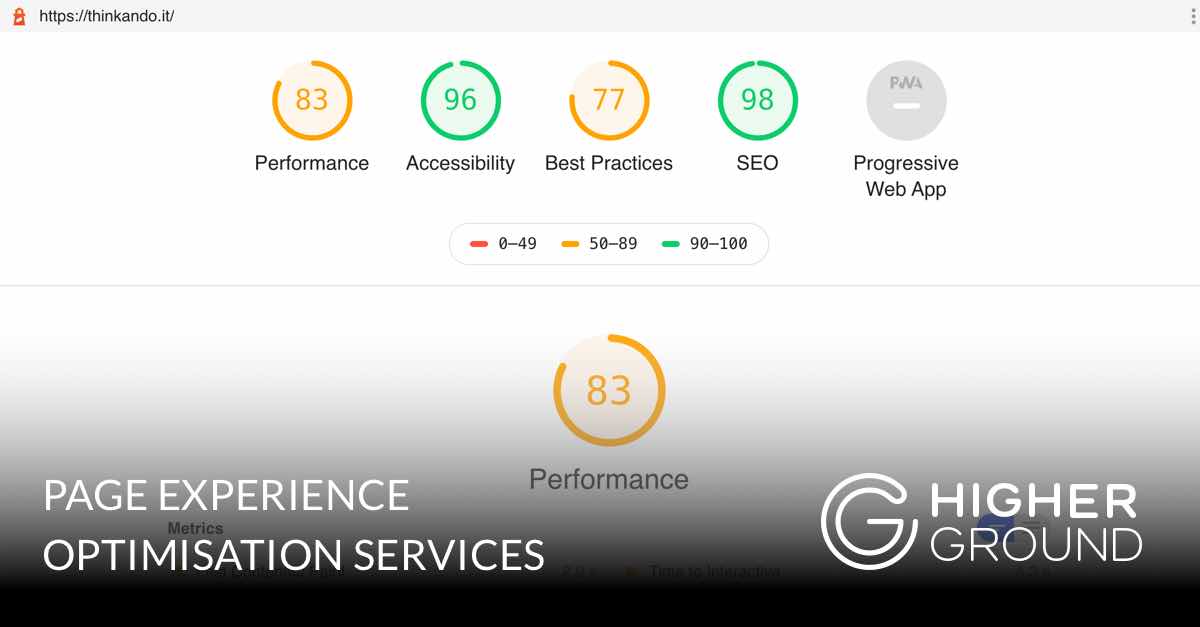
What is Google’s ‘Page Experience’ update?
Over the years, Google has got better and better at spotting good and bad websites. Long gone are the days you could just stuff as many keywords as possible and watch your website sail to the top of the rankings.
But the new Page Experience update - due for 2021 - promises to be the biggest change to how Google ranks websites in years.
And they’ve been kind enough to tell us all about it in advance. As the saying goes, failing to prepare is preparing to fail.
Higher Ground are a User Experience agency bringing you helpful and informative articles designed to help you learn more about digital strategy.
Page Experience - at a glance
The Page Experience update will prioritise websites that users enjoy when deciding Google rankings. It’ll consider things like:
Page speed - how quickly your site loads
Visual stability - e.g. unexpected pop-ups will be penalised
Interactivity - how quickly users can actually interact with your page. If there is a lag, which can be caused by poor code, your rankings could suffer.
Google says it’ll still prioritise great page content - but if you’re not getting the technical stuff right, you are risking a big drop in your rankings when the update arrives.
So what makes a great page experience?
A user’s experience of a website is a combination of factors - not just design and content, but all the stuff that sits behind it.
Our top tips for ensuring great page experience are:
Ensure page layouts are well-optimised on all devices, including smartphones, tablets and bigger screens. Users should be able to easily find the same info on their commute home as they saw on their laptop earlier that day.
Consider using CDN hosting for your page content - this improves load times.
Compress all images, CSS and Javascript
Make sure pages are secure with HTTPS, and an SSL certificate to prove it - this prevents hackers intercepting private data
Create pages that guide your users through the journey. Don’t just rely on navigation menus to perform this task
Research your users and their top tasks, and ensure your content caters for these things
Provide video for people who don’t want to read.
How can I prepare for the update?
Google is providing a wealth of information on how you can measure your site’s performance in anticipation of the Page Experience update.
In the developer notes, Google provides detail on the main metrics you will need to look at when assessing your website’s performance. In particular this includes the new Core Web Vitals, which are the key metrics for measuring loading performance, interactivity and visual stability.
These are all quite technical, so you may want to bring in an organic SEO expert to help you understand how well-optimised your website is now.
We recently helped Heidi Vilkman with a website for her pattern designer services. She is now ranking in the top 3 positions for her target keywords.
Making user experience and SEO work together
The bottom line of all this is that from next year, user experience design and SEO will be more intertwined than ever before.
It’s been known for a long time that Google considers things like time on page and bounce rates when deciding where to rank your website. But this goes even deeper - looking at your pages in very much the same way as a human would, and penalising poor layouts and unexpected site behaviour.
In short, getting your website experience in order now will save you a lot of time, money and stress when the Page Experience update lands next year.
This article was written by UX design Agency - Higher Ground









